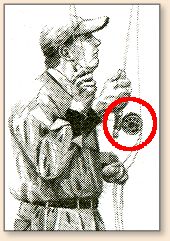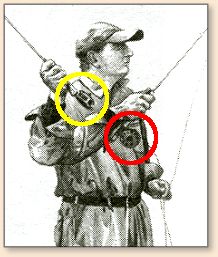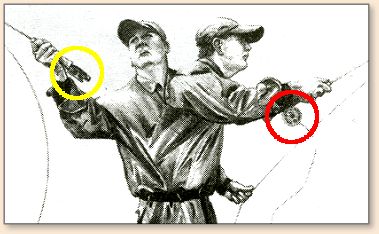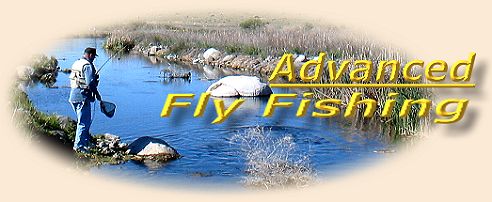|
I want you to visualize something, right
now. Throwing. You need more information,
right? Ok, let's make it a ball. Go ahead,
you've got the ball in your hand, make it
a baseball, now wind up and mentally give
it a good pitch. Humor me on this; do it
again. Visualize your hand, the ball the
ball going back past your right shoulder
reversing direction and coming forward, and
finally rolling off of your fingers. That
is a pitch. A right-handed pitch.
Alright, now visualize this please. Trust me
here, we are going someplace with this. This
time make it a dart. Ok now, go ahead and pitch
the dart at an imaginary dart-board. One more
time please. This time really aim at the board,
hit the center ring.
Whoa... What are you doing? You changed your
grip on it! And you didn't swing your arm
around like with the baseball. You used a
very straight line motion with your arm and
wrist too. Why did you change things? I don't
have to answer that, you know the answer yourself.
Because each method worked for the job asked for.
So, how about fly casting, any connection?
You bet there is. Try to follow this in your
mind, then I will show some pictures to help
you as well. Agree first that line speed is
important to any cast, the most speed with
the least amount of effort is optimum. A
straight line will produce that optimum.
Your fly rod is out in front of you now, thumb
on top, reel hanging down. Pull back. The tip
goes down. You raise the rod farther to vertical.
The tip is bent even more. You bring the rod back
farther, your hand is by your ear now and the reel
has rotated to the top of the rod, the rod is
bending even more now. If you stop right there
the rod will straighten, the line will continue
going back. The energy stored in the blank now
uncoils in exactly the opposite direction from
which it was loaded.
Now bring the rod forward to vertical, now
farther to the front stop position and stop.
The rod again uncoils releasing it's stored
energy, helping the cast go straight and true.
That is the way it should be to be the most
economical. Sadly often it is not the case.
Here is what most of us do, even old-timers,
especially old-timers who started out with
un-economical rods and had to exert additional
force and attempt to lengthen the rod by
extending their arm. They swing the reel out
to the side on the back-cast and return it on
the fore-cast. So what? It twists the rod during
the cast, both ways. Will it work? Sure, I bet
98% cast that way, maybe more.
What happens is this. As the rod bends on your
first lift the rod is compressed against the
guides which are on the bottom at the start
of the cast. Then you go into the back-cast
and swing the reel (guides are on the same
side as the reel is) out to the side. The rod
wants to straighten but you have twisted it
now and are forcing it to unload at 90 degrees
instead of the 180 as it should. Fair enough
except now you make a front cast and do the
same thing. Starting with the reel out, you
power forward and twist the rod to the down
side where you started out. Again the rod has
to unload at 90 degrees.
Will all of this make much difference? Some.
I prefer to be as economical as possible and
so I do not swing my reel out. I find my casts
go straighter and farther with less effort. One
reason so many do not bother doing this little
advanced step is they do not know better. For
years the print media has been showing pictures
showing the casting being done poorly, here is
an example.

The first picture shows a cast about to start, all is well

This shows the reel already swung to the outside,
remarkable!

And this is hilarious, no excuse for this at all.
So there you have it. Just one of the little
things the better casters do that you probably
have not noticed. But, then again, little things
can mean a lot I guess. ~ JC
|




